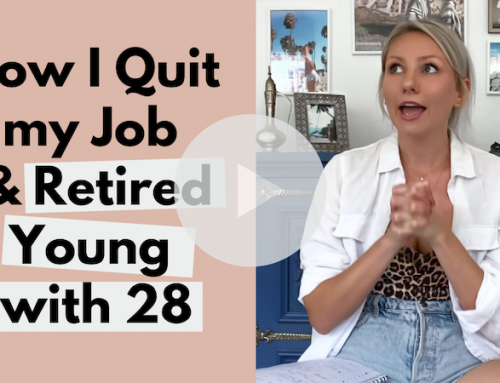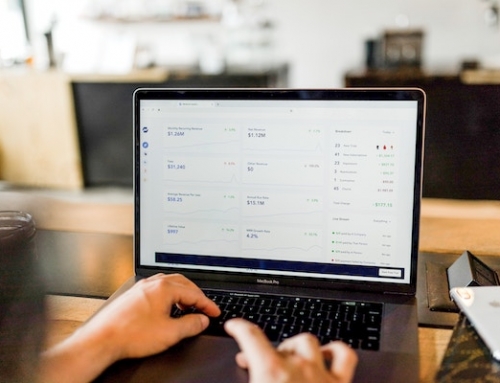Financial freedom is a term that is getting more popular these days. And there is a good reason for it.
With millennials seeking self-fulfilment in their lives more than any generation before, having to work at a job with the only motivation of income doesn’t cut it.
Achieving financial freedom means you don’t have to be dependent on your job to sustain yourself. Hence, you can spend your time doing things that make you happy.
In this post we explain what financial freedom is and what it is not, followed by 12 easy baby steps that you can take today. The good things is that you don’t have to take all 12 steps at once, but you can apply any of them independently.
Since you are here, you won’t want to miss these posts:
- How to Make Money Online
- Financial Independence Retire Early And Travel
- Early Retirement – 8 Resources You Need
📌 Save this post to your Financial Freedom board on Pinterest!📌

What is financial freedom?
Financial freedom is essentially having sufficient income and money that you can live the lifestyle you want without having to work for it.
This can be steady passive income that you receive from various forms of investment. Or it might be that you have saved up a sufficient sum that you can withdraw from for the rest of your life, without it finishing.
Many people end up chasing a career for its financial merits rather than their passion in that field. It’s no shocking news. After all, living comfortably, pursuing hobbies, or raising a family do require big bucks. So, we compensate fun in our day job, to enjoy the benefits that come with more money.
With financial freedom, the sacrifices we make for money are minimized.
Financial freedom allows you to pursue a career without being driven by the potential income you will earn. In other words, it is about not having to work, but choosing to work on things you want to.
Financial freedom is not about being rich, driving fancy cars, and having a butler at your side. It is about living a content and fulfilling life. It all depends on your desires and what makes you happy. If you are satisfied with your current level of income, but not with your job, then reaching that income level is your financial freedom goal. Most likely, you do not need billions to support your current lifestyle.
Here are 12 easy steps to financial freedom
1. Know why you want financial freedom
As mentioned above, financial freedom is not about becoming ultra rich. It is about having a lifestyle your are content with. You need to understand the notion that more money does not equal more happiness. It is really important that you think deeply about what really brings you joy. Then you can focus on including those aspects in your life.
We previously share a 10 minutes exercise you can follow to design your perfect day. We believe that this is where it all starts. Your lifestyle is determined by your daily routine. If you optimise and think about your perfect day, you can work towards it.
Through defining the lifestyle that you want to have, you can have clear goals as to why you want to attain financial freedom. This will in turn help you to stay motivated while chasing your goal.
2. Create a budget
This one sounds like something your parents might tell you. But hey, your parents didn’t get to where they are not knowing what they were doing. Having a clear budget is an essential step towards financial freedom.
Not having a budget is like throwing darts in the dark and hopping to hit the bullseye.
To make a budget, start by listing high-level categories of spending. Usually this would include the following categories:
- Shelter expenses: rent / mortgage payment. utilities, and city / property taxes.
- Living expenses: food, household products (e.g. shower gel), etc.
- Hobbies and fun expenses: hobbies (e.g. dance class), evening out with friends, etc.
- Gifts expenses: Someone close has a birthday every month…
Try to fill in those categories with sub-categories and attach a monetary value to each. Some things may vary. For instance for gifts, you might not know the exact amount you will spend each month. Try to look over the last 3 months and average out the amount you spent on gifts per month. If you have the feeling it’s too low, raise it a bit. It is better to spend less than your budget than more.
You might not get your budget right the first time. It is an ongoing process, and requires a bit of trial and error before you get a good grip on it.
Once you figure out a reasonable budget that works for you, do your best to stick to it.
3. Control your spending
If you want to achieve financial freedom sooner rather than later, make sure to control your spending. Becoming financially free requires that you also live a frugal lifestyle.
This does not necessary mean withholding all desired pleasures from yourself, but rather being conscious about what you spend your hard earned money on. If you are guilty of impulsive shopping, you are not in control.
Spend your money mindfully on things that truly make you happy. Don’t let momentary urges take over. One way to become aware of this is to do a backwards reflection exercise at the end of the month. Look at your spendings, either in your bank statement or credit card statement, and see if you see anything that you could have been just as well off if you didn’t spend it. Make a not of it, and try to avoid similar spendings next month.
4. Understand what you own
To reach financial freedom, you will want to own some assets. perhaps you already own some now. It is important that you have a clear overview of what you own and understand how these assets can contribute to your financial freedom.
One thing to note here is what we mean by assets. We like to take on the view of Robert Kiyosaki, the author of Rich Dad, Poor Dad. He suggests that assets are only things that you own that generate income.
According to Kiyosaki, the house you live in is not an asset but rather a liability. It does not generate income, and you have to pay for owning (mortgage, taxes, etc). Therefore, you are actually loosing money rather than gaining on it. This is the gist of it, if you want to understand this important concept better, we strongly recommend you read the book Rich Dad, Poor Dad.
Lastly, it is also important you make a distinction between liquid and illiquid assets. The liquidity of something is a financial term. If something is liquid, it means it can be sold for cash immediately or easily traded for something else.
In the case of your assets, it might play in the following way. If you own a property as an investment and it is generating cash, you can call it an asset. The money (downpayment) you used to buy the property is illiquid, since a property cannot be turned into cash immediately. Selling a property is a lengthy process. On the other hand, money you invested into stocks is liquid as you can sell it at the market asking price on any day, and get cash for it.
5. Understand your debt
If you are like the rest of us, you must have used some debt to get ahead in life. Most commonly, we lend money to study, which is a debt we end up owing for a long time after we graduate. Other forms of debt might be credit cards, mortgages, instalments for things you purchased, or any other loan.
It is of utmost important to map out the different debts you have. Make a comprehensive list of all the loans you have ongoing. Once you have a complete list of your debt, you’ll need to understand the different types of debts and what they cost you.
Different loans have a different price (i.e. interest rate). Credit card debt is amongst the highest forms of debts. Once you have your debt list, figure out how much each debt is costing you, that is on top of your initial loan (the money you actually got).
Think about paying off costly debts faster. Unless you are earning more on your money through investments, it’s to use it better to pay off the debt first. We are not suggesting you should necessarily become debt free, yet you should avoid high cost debt and make sure that you earn more with your cash than what you have to pay for debt.
6. Automate transfers to your savings
Automating a transfer to your savings account is one of easier things you can to do attain financial freedom. Wouldn’t it be amazing if suddenly, at the end of the year you realise you have saved up 5000 Euros without even thinking about it?
There are different forms of automated savings. The most traditional way is to schedule a direct transfer to your savings account every month. Another option that is offered by many banks these days is to round up charges to your debit or credit card,. This will automatically transfer the difference amount needed to round up to your savings account. That way you save a bit with every purchase.
A less computerised approach is to put all coins leftover at the end of the day into a piggy bank. If you pay a lot with cash, you will have many coins left over, and your piggy bank will become heavier quite quickly. Make sure to deposit the cash at the bank once in a while so that you can earn interest on it in a savings account or invest it.
7. Know how your pension plan helps you reach financial freedom
Attaining financial freedom is something that millennials seek to achieve before reaching the retirement age. Nonetheless, it is still important to have a good understanding of your pension plan.
Many of us know that from our salary slip, we put something every month into our pension plan (401k in the US). It differers per country, but there is a system in place almost everywhere in the world. Have you ever stopped to think what happens to this money?
In most cases, you have some sort of an influence on it. You can choose how this money will be invested by a pension fund. Whether it should be a risky or defensive approach, and in some cases you can also invest some extra into your pension fund.
Your pension fund should be taken into account when planning for financial freedom. From the legal age of retirement, you will have access to this money. Therefore you can consider that as a future source of income when crunching your numbers for financial freedom.
8. Get your first book about investments or financial freedom
Most millennials are intimidated by the notion of investments. Having reached adulthood around the financial crisis at the end of the last century, a lot seem to be scared off by their parents’ panic.
The truth is, the market crashes often and the economy shrinks and grows in cycles. Still, average people manage to increase their wealth over time by owning stocks and bonds.
We are not suggesting you become and investment guru. However we are saying that you should consider investing in stocks or bonds. That being said, we also think that you should understand what you are doing and not blindly throw your money into the stock market.
There are plenty of easy to read beginner guides that explain the way everything works and that can get you more comfortable with investing. Take a look at our 8 resources for early retirement post.
If you don’t like books, check out Investopedia. They have by far the biggest investment and finance free online knowledge base out there. You can sign up to one of their free newsletter series for beginner investors.
It is never too late to start, but you have to start somewhere.
9. Open an investment account
As mentioned earlier, for millennials the hurdle to investing seems to be the bigger than other generation before. Unburden yourself and open an investment account. It is all about taking the first step. You don’t have to immediately invest.
These days, there are so many investment brokers out there that offer investment accounts without any fees. Usually investment brokers would be happy to open an account for you and might even give you a small bonus gift for opening the account. You would usually not have to pay anything until you have actually made your first investment.
So, what are you waiting for? Just open an account so that you can start investing when you feel ready to.
10. Practice with a stock market simulator
The best way of learning is by doing and gaining experience. There are many stock brokers that offer a free stock market game or simulator to let you try out their platform. Some even have tournaments where you can compete against others and see who can earn the most from trading.
A good free simulator to try out is Investopedia Stock Simulator. It is free and quite a nice platform to start experimenting with.
By participating in these stock market simulators, you will get a good feeling of what its like to invest. You will learn about yourself and your risk appetite. That way, once you want to start to invest, you can avoid beginners’ mistake.
11. Set realistic financial freedom targets
Financial freedom is not attained overnight. It is a journey that takes time a perseverance. At first it might seem like a huge mountain to climb. Don’t aim for financial freedom within a month or a year, break it up into pieces. Set yourself realistic milestones and small targets that you would like to achieve along the way.
Your targets should be determined by the budget you need and the lifestyle you aspire for. Set a financial target with a time frame that is realistic. For instance a target might be to cover 10% of your monthly budget through other sources of income than your salary within half a year. This is something you can work towards.
Make small targets to start with. If you aim for small achievements in the beginning, it does not mean that it will take you an eternity to reach your final goal. Hence, 10% in half a year doesn’t mean it will take you 5 years to reach 100%. Your targets will grow as you achieve each goal because you will learn along the way.
Just be sure to have targets with dates that you can work towards. Include those on your vision board as well, so you can focus your attention and efforts on them.
12. Create passive income
Passive income is any income that your have that is not directly related to a job that you do.
The word passive might be a bit deceiving, since nothing is earned with no effort at all. Nonetheless, passive income requires a minimal effort, hence it does not require your daily attention to work.
There are various ways you can create passive income. Some of those are through real estate investing, stocks and bond dividends, affiliate marketing, etc. We will not elaborate on the different ways in this post, however we do urge you to consider how you will create passive income in order to attain financial freedom.
An important aspect of creating passive income, is to ensure that it is diversified. Do not put all your money and effort into one stream of income. If something goes wrong with that particular source, all your passive income might be at risk.
Reduce your risk of over depending on one type of passive income by spreading your money and effort. Ensure you are not overdependent on any single one of your passive income sources.
Bonus step to financial freedom
Taking up any of the above baby steps to financial freedom will set you on the right path. It is important to start somewhere, and even better to start earlier rather than later.
As a final step, we would like to ask you to pick 3 of the above steps that you will start implementing from today.
Let us know in the comments below which ones you choose.








Leave a Reply